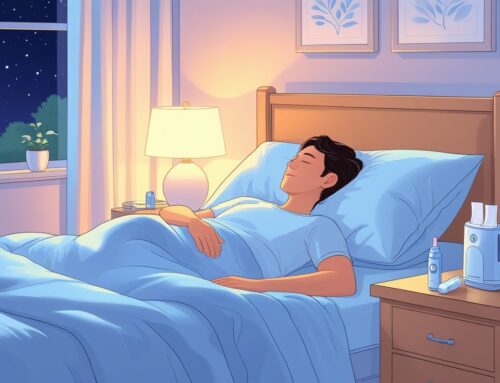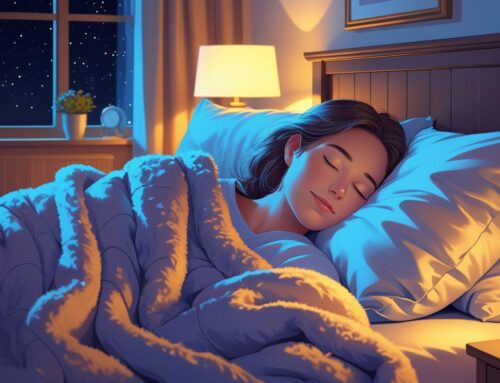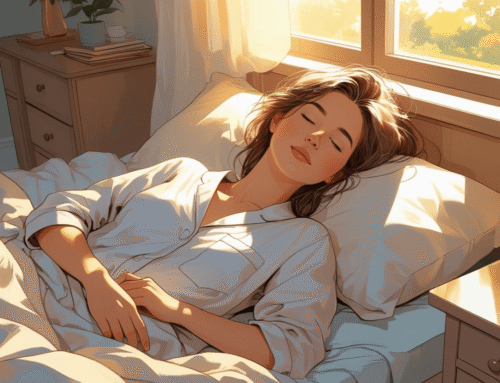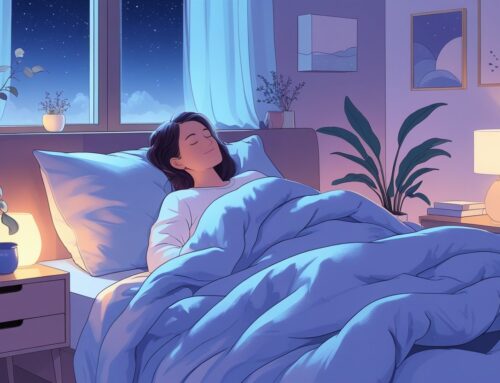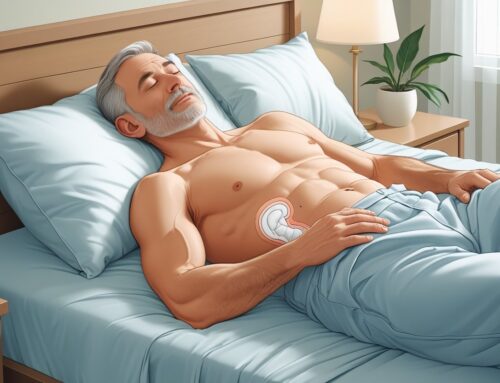Sleeping with a urinary tract infection is never easy. The pain, burning, and constant urge to go to the bathroom can make it almost impossible to rest. Even when you’re exhausted, the discomfort has a way of keeping you awake.
There are a few simple habits that can help you feel a little better at night. Make sure to empty your bladder completely before bed so you’re not waking up right away with the urge to pee. Skip drinks that can irritate the bladder, like coffee, soda, or alcohol, and try to stick with water in the evening. Loose cotton clothing can help reduce pressure, and a heating pad on your lower belly may make the cramps and discomfort easier to handle. Over-the-counter pain relievers or UTI-specific medicines can also help take the edge off long enough for you to fall asleep.
How you sleep matters too. Some people feel less pressure when lying on their back with a pillow under their knees, while others are more comfortable on their side with a pillow between their legs. It may take a little experimenting to find what feels best, but the right position can make a big difference.
These steps won’t cure the infection, but they can make nights more manageable until treatment starts working. Getting a little more rest gives your body a better chance to heal.
Key Takeaways
- Doing a few simple things before bed can ease UTI discomfort at night.
- Sleeping in a position that puts less pressure on your bladder can help you rest better.
- Taking care of symptoms early makes healing easier and more comfortable.
- The right mattress can make sleeping easier if you have UTI symptoms, as it supports your body and reduces pressure on sore areas.
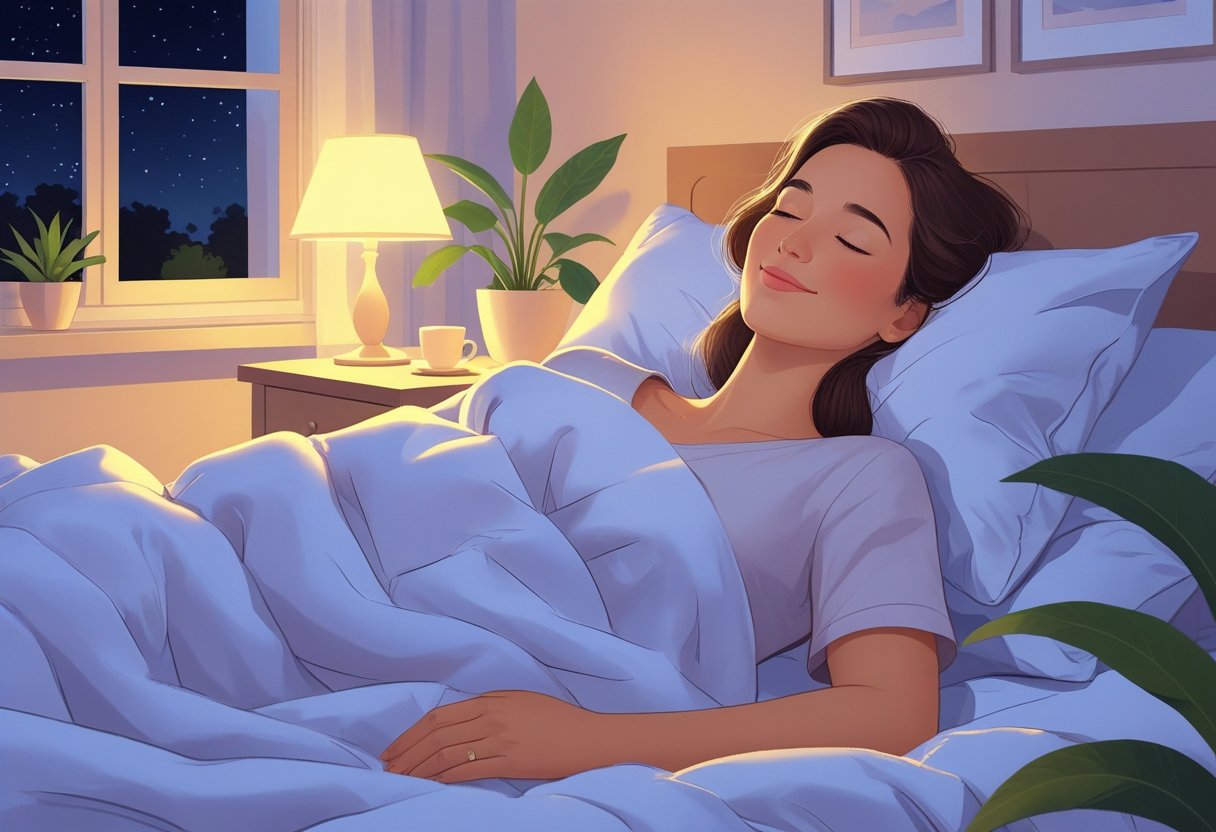
Understanding Why UTI Symptoms Are Worse at Night
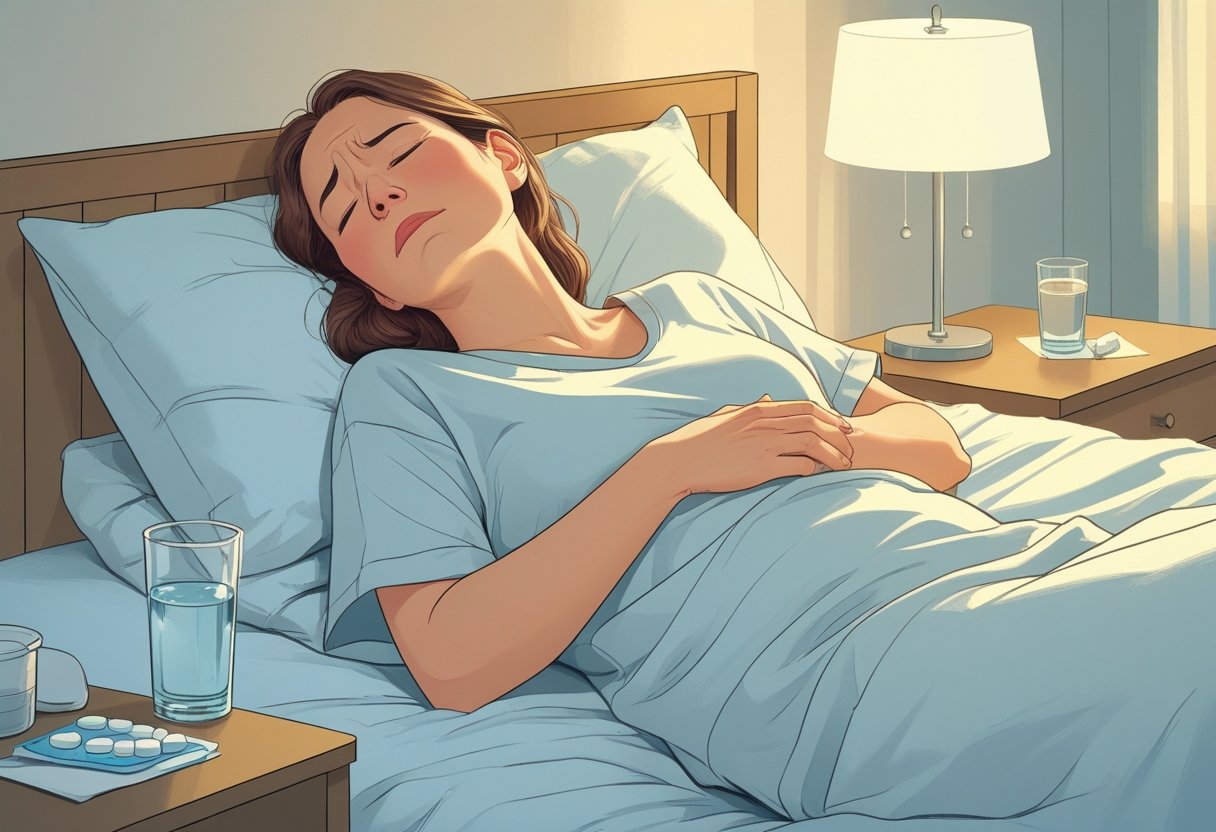
Dealing with a urinary tract infection (UTI) is rough enough during the day, but many people find that the discomfort spikes once they try to sleep. The body changes how it handles fluids at night, and the bladder becomes more sensitive. This makes pain, pressure, and the urge to use the bathroom harder to ignore, which often keeps people awake.
Common Nighttime UTI Symptoms
When you have a UTI, nighttime can bring stronger urges to urinate, even if only a small amount comes out. The burning feeling while peeing is common, and cramping or pressure in the lower belly or pelvis may increase once you’re in bed. These symptoms can wake you up several times, leaving you exhausted by morning.
Bladder Irritants and Nighttime Discomfort
Some foods and drinks make a UTI even more uncomfortable. Caffeine, alcohol, and acidic foods like citrus or tomatoes can irritate the bladder and trigger more burning. On top of that, urine becomes more concentrated overnight because your body makes less of it while you sleep. That concentrated urine can sting more when it passes, adding to the discomfort.
Skipping these irritants in the evening and limiting drinks a couple of hours before bed may help you rest easier.
Why It’s Harder to Sleep With a UTI at Night
Several factors make nights tougher. With less urine production, the bladder gets more sensitive and the pain feels sharper. The quiet of night also makes every twinge more noticeable. And since the infection triggers frequent bathroom trips, your sleep gets interrupted again and again. This cycle of pain and waking up explains why so many people find it nearly impossible to get solid rest with a UTI.
Pre-Bedtime Habits for Easing UTI Discomfort
Managing your fluids and bathroom habits before bed helps if you have a UTI. Drinking and peeing at the right times helps reduce pain and stops you from waking up so often. Simple changes can make falling asleep easier even with UTI symptoms.
Drink Water During the Day
Try to drink enough water spread throughout the day instead of all at once. This helps flush bacteria from your urinary tract and can ease irritation. Avoid sugary or caffeinated drinks, since they can make your bladder feel worse. Herbal teas without caffeine are okay, but water should still be your main drink.
Cut Back on Fluids at Night
Stop drinking large amounts 2 to 3 hours before bed. This can reduce how often you wake up to pee. Avoid alcohol, caffeine, and heavy meals in the evening. Controlling your evening fluids can ease pressure and pain at night and help you sleep longer.
Empty Your Bladder Fully
Make sure to fully empty your bladder before bed. Taking your time, sitting comfortably, and relaxing can help. Some people find it helpful to go twice in a row to reduce pressure. This can lower nighttime urgency and make it easier to rest despite the UTI.
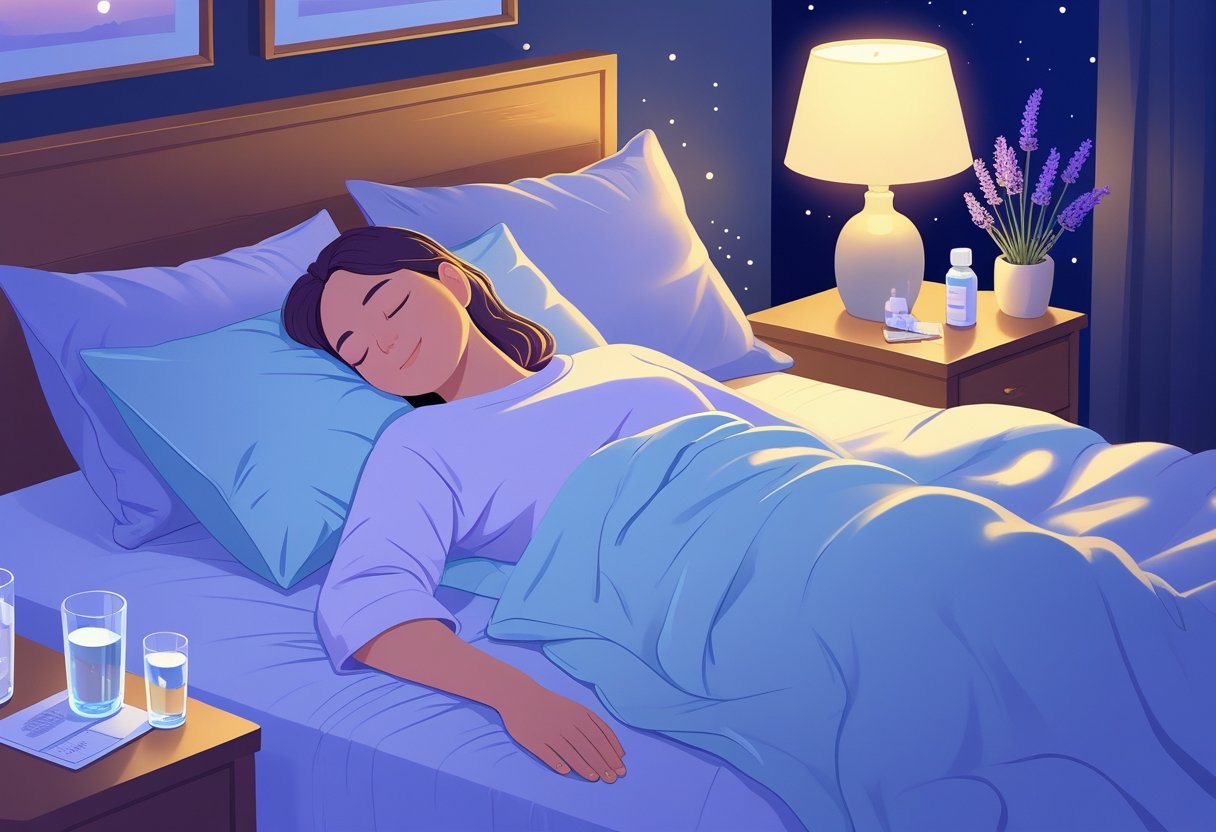
Optimal Sleeping Positions for UTI Relief
When you have a urinary tract infection, even lying down can feel uncomfortable. The pressure, burning, and urge to pee can make it hard to rest. But the way you position your body at night can make a big difference. Some positions take pressure off the bladder and help urine drain, while others only make the pain worse.
Good Positions for Sleep
On your back
Lying flat on your back is often the easiest position. It keeps the bladder and urethra in a neutral spot so there’s less pressure in the pelvic area. Try to keep your legs straight instead of propping them up or bending your knees. This gives your bladder the best chance to drain fully.
On your right side
If sleeping on your back doesn’t feel right, try your right side. This position keeps your colon from pushing against the bladder, which can ease discomfort. Pull your knees up just a little toward your chest, but don’t curl too tightly. A pillow between your knees can also help keep your spine straight and reduce strain.
Slightly upright
If the pain feels strong, propping yourself up can help. Rest at about a 30–45 degree angle using a wedge pillow or by stacking firm pillows behind you. The tilt uses gravity to make urine flow easier and takes pressure off the bladder. Once you feel better, you can go back to lying flat or on your side.
Positions to Avoid
On your stomach
Avoid lying face-down. This pushes directly on your bladder and bends the urethra, which makes it harder to empty your bladder completely.
Curled up tight
A tight fetal position can trap urine and add pressure where you don’t want it. If you sleep on your side, keep your back straight instead of curling all the way in.
Legs raised
It might feel natural to tuck a pillow under your knees, but this actually tilts the bladder forward and makes draining harder. It also puts extra strain on the urethra. Keep your legs flat instead for better comfort.
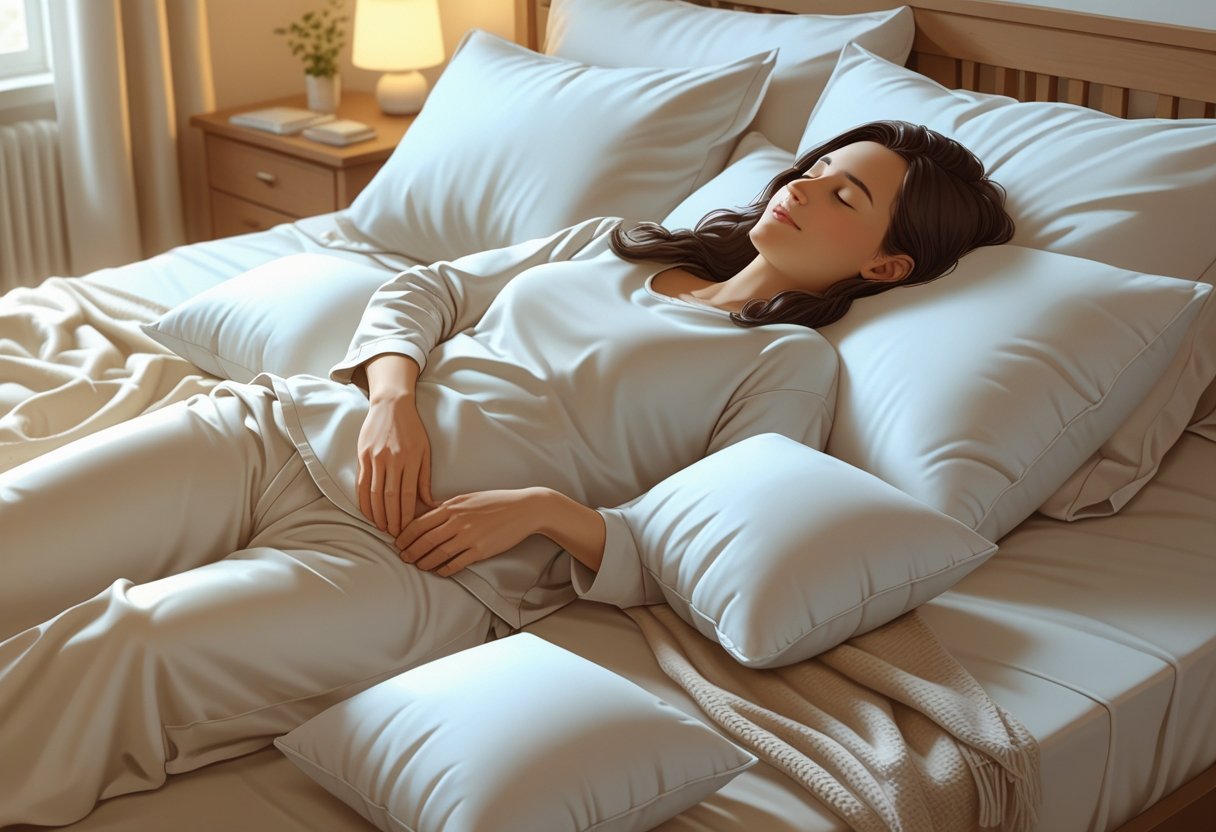
Home Remedies for Nighttime UTI Pain
Trying to sleep with a urinary tract infection can feel impossible. The pressure, burning, and cramps don’t exactly go away when you lie down. But a few small changes in your nighttime routine can make the pain more manageable and help you get some rest.
Use Heat Carefully
Warmth can be soothing when your bladder feels irritated. A heating pad placed on your lower belly can relax tight muscles and calm the ache. It also helps improve blood flow, which may reduce swelling. If you don’t have a heating pad, a warm washcloth or compress works too. Keep it on for about 15 to 20 minutes. Just make sure it’s not so hot that it burns your skin. Pairing heat with a glass of water and over-the-counter pain medicine, if your doctor says it’s okay, can make it easier to drift off.
Wear Loose Clothing
Tight clothing can make irritation worse when you already feel sore. Swap snug waistbands and clingy fabrics for soft, roomy cotton pajamas. Cotton underwear is also a better choice than synthetic materials because it keeps things cool and dry.
The goal is comfort. You want fabric that doesn’t rub or trap heat, so your body can relax instead of feeling more irritated.
Make Your Bedroom Comfortable
Even with pain, a good sleep setup can help your body wind down. Keep your room cool — somewhere between 60 and 67°F usually feels best. If noise keeps you up, try a fan or white noise machine. If light sneaks in, blackout curtains or a sleep mask can help. Turn off screens at least 30 minutes before bed since the blue light makes it harder to fall asleep. And use pillows or soft bedding to support your body so there’s less pressure on your belly.
Little adjustments like these won’t cure the infection, but they can make the nights more bearable until you feel better.

Short-Term Pain Relief Strategies
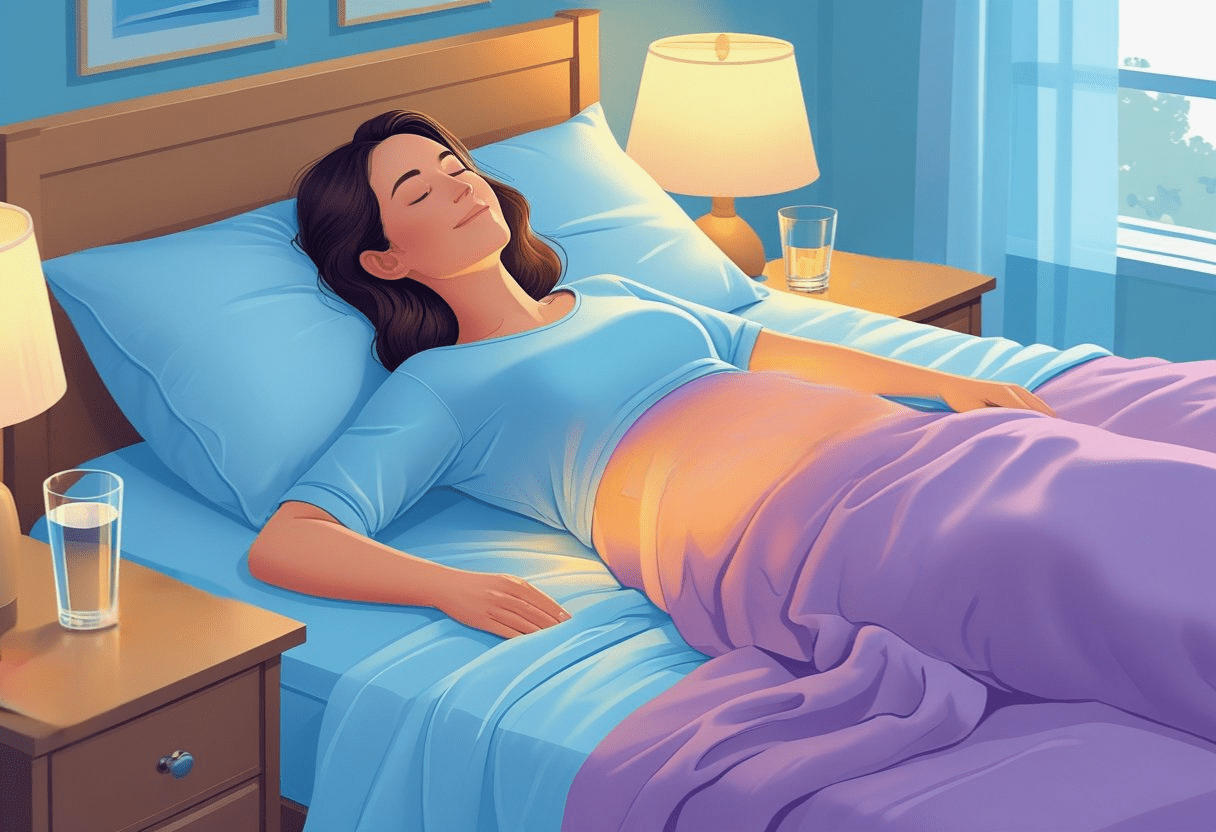
Pain Relief
Over-the-counter pain medicine can help take the edge off. Ibuprofen can calm bladder inflammation, while acetaminophen may ease mild pain. Another option is phenazopyridine. This medicine targets urinary pain like burning and urgency. It won’t clear the infection, but it can make things more bearable until antibiotics work. It should only be used for a few days and always as directed. Taking it with food can help prevent an upset stomach.
Using the right medicine before bed may lower discomfort enough to fall asleep.
Bathroom Routine
Waking up to pee all night makes it harder to rest. Try emptying your bladder right before bed so it doesn’t fill as quickly. Some people even set a quiet alarm once during the night so they don’t wake up in pain from urgency. When you go, sit comfortably and give yourself time to fully empty. Rushing can leave urine behind, which adds to the pressure and discomfort later. A steady routine may help cut down on the number of times you wake up.
Reducing Stress
Pain feels worse when your body is tense. Stress also makes it harder to fall asleep. Try relaxing before bed. Slow breathing, gentle stretches, or listening to soft music can calm your body. Turn off screens and bright lights an hour before sleep. Make your room quiet, dark, and cool if possible. Lower stress can also relax the pelvic muscles, which may ease pain and make it easier to rest.
When to Seek Medical Attention for UTI and Sleep Issues
If UTI symptoms get worse or keep you from sleeping, see a doctor. Acting early can prevent complications and help you recover faster.
Warning Signs of Complications
Seek medical attention right away if you notice:
- Fever and chills: Could mean the infection has reached your kidneys.
- Severe flank or lower back pain: Intense pain on either side.
- Nausea or vomiting: Makes it hard to drink fluids.
- Blood in urine: Might indicate a serious infection or damage.
- Confusion or severe weakness: Could be a sign the infection is spreading.
These signs need prompt care to avoid serious health risks.
Persistent Sleep Disturbance with UTI
If frequent urination and pain last more than a few days or regularly disturb your sleep, check with a healthcare provider. Sleep problems usually get better within 24–48 hours after starting antibiotics. If they don’t, the infection might be resistant or more complex.
Finish your full antibiotic course even if sleep improves early. Persistent symptoms may need more tests or a different treatment. Pain relievers and changing sleep habits can help, but they don’t replace proper medical care.
Choosing the Right Mattress for Comfortable Sleep with a UTI

Trying to rest with a urinary tract infection isn’t easy. The constant urge to pee, pelvic pressure, and burning pain can keep you awake at night. While medicine is what actually treats a UTI, your sleep setup can make a real difference in how comfortable you feel. A good mattress, along with the right bedding and room environment, can take some pressure off sensitive areas and help you settle in for better rest.
Your mattress plays a role in how your body feels during the night. If it’s too firm, it can press against your lower belly or hips, which might make UTI pain worse. If it’s too soft, your spine can sink out of alignment, which adds discomfort. A medium mattress usually works best because it balances support with cushioning. Hybrid mattresses are often a safe pick. They combine foam and coils, so they mold to your shape while still holding up your body weight. This design helps spread out pressure points, especially around the hips and lower back. That’s useful if you’re tossing and turning because of bladder sensitivity.
Your bedding can also affect how well you sleep through UTI symptoms. Breathable sheets, like cotton or bamboo, keep your skin cool and dry. That matters because heat and sweat can make irritation worse. Keeping your room between 60 and 67°F also helps your body stay comfortable enough to drift into deeper sleep.
If you’re looking for an example, the Helix Dusk Luxe is one option that checks the boxes. Its mix of memory foam and coils keeps it supportive but not overly firm. The foam layers hug your body to spread weight evenly, while the coils allow airflow so the mattress doesn’t trap heat. That combo can make it easier to rest, even when your bladder feels sore or sensitive.
Frequently Asked Questions
Sleeping with a urinary tract infection can be uncomfortable. Pain and frequent trips to the bathroom make rest difficult. Adjusting sleep position, trying simple home remedies, managing pain, and watching your diet can help you sleep better.

